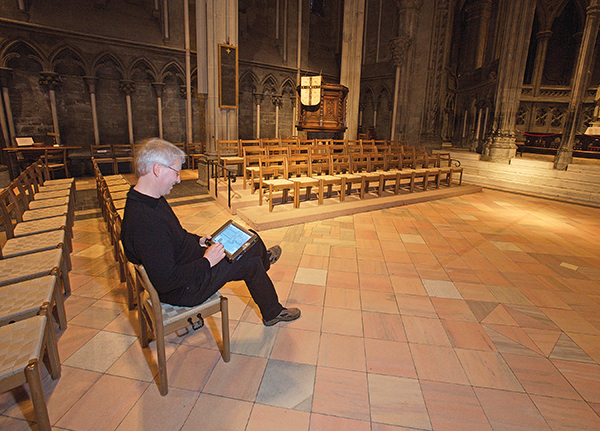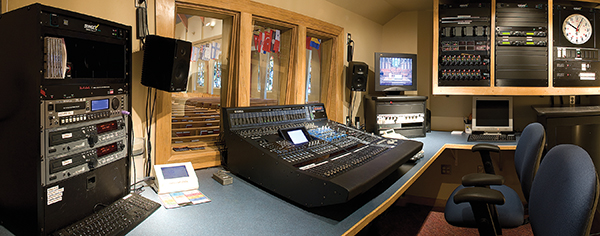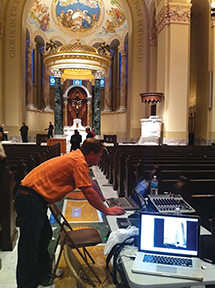
By Rik Kirby & Daniel Keller
![]() Over the past few months, we’ve talked extensively about what to look for in a sound system. We’ve looked at different types of loudspeakers and audio technology. We’ve talked about evaluating your sanctuary space, your style of service, and your budget. And, we’ve talked about the importance of hiring a professional for what amounts to one of the biggest investments your church will make.
Over the past few months, we’ve talked extensively about what to look for in a sound system. We’ve looked at different types of loudspeakers and audio technology. We’ve talked about evaluating your sanctuary space, your style of service, and your budget. And, we’ve talked about the importance of hiring a professional for what amounts to one of the biggest investments your church will make.
It makes sense, then, to conclude this series by talking a bit about maintaining your investment.
 Unlike today’s disposable consumer electronics, professional audio equipment is not designed to just “set and forget.” Like any precision instrument, it should be maintained, calibrated and tested on a regular basis to keep it running at peak performance.
Unlike today’s disposable consumer electronics, professional audio equipment is not designed to just “set and forget.” Like any precision instrument, it should be maintained, calibrated and tested on a regular basis to keep it running at peak performance.
Consider that in an average church audio system, the signal might be passing through hundreds — or even thousands — of electronic components before reaching your ears. As with any complex system of many parts, a simple failure can always occur. Although today’s modern electronic equipment is exceptionally robust, heat, dust, and general wear and tear can cause components to deteriorate over time.
Inexperience can also play a role. In a great many of today’s churches, most (if not all) of the technical staff are volunteers, with varying degrees of expertise. Carelessness and a lack of training can contribute to short- or longer-term equipment damage — microphones get dropped or yanked from their connectors, equipment racks get bumped, and liquids get spilled. In short, stuff happens.
Many of the most important steps to protecting your equipment come down to pre-planning. Most churches don’t have the luxury of a separate room for front-of-house position, which is all the more reason to invest in locking equipment cabinets. Making essential audio equipment inaccessible to all but qualified personnel will prevent inexperienced users from trying to adjust system settings that should be left to those who are properly trained.
If you’ve invested in a mixing console, a locking cover can keep dust and liquids out. A good system designer will suggest these and other protective measures, and include them in the overall system design.
 Keeping up the upkeep
Keeping up the upkeep
Going with the premise that an ounce of prevention is worth an expensive repair bill, it makes good sense to consider a regular maintenance contract. Many professional A/V firms offer maintenance contracts, and in many cases you will find that your system designer or installer provides one as an optional service. If they do, it makes good sense to consider entrusting your system’s upkeep to the people who know it best.
Just as every system is different, the cost of a good maintenance contract can vary, depending on the complexity of your system and the availability of qualified technical professionals in your area. As a very general rule of thumb, some professionals suggest calculating your maintenance budget by taking the original cost of the system and dividing it by the expected useful life of the main components. For example, if your system costs $60,000, and its projected lifespan is 10 years, you can expect to pay about $6,000 per year, or $500 per month. (Again, these are only estimates.)
Many churches make the mistake of assuming that since their system is new, they can forego a maintenance contract. After all, even if something breaks, it’s under manufacturer’s warranty, right?
 While that might be true, it’s important to consider whether anyone on your technical staff has the expertise to identify the problem. Also, most manufacturers’ warranties require you to return the equipment to them for repair. Consider whether you can afford to be without a critical part of your system for what could potentially be weeks, if not longer.
While that might be true, it’s important to consider whether anyone on your technical staff has the expertise to identify the problem. Also, most manufacturers’ warranties require you to return the equipment to them for repair. Consider whether you can afford to be without a critical part of your system for what could potentially be weeks, if not longer.
Most regular maintenance agreements include periodic visits; these are typically scheduled once or twice a year (though a complex and / or heavily used system might be better served by a monthly visit). Here too, your system designer can advise you of what’s best.
A routine maintenance inspection can take several hours, and usually includes a full operational evaluation. Your audio pro will route signal through all major paths, testing and calibrating levels for consistency. A physical inspection and electrical safety check are also performed, including checking for loose wiring at critical points such as microphone and speaker connections, battery contacts and so on. Loudspeaker and amplifier performance is measured. If your church uses any wireless systems — including microphones, in-ear monitors, or mixers — those systems are tested, as well.
One of the benefits of maintaining a regular system maintenance schedule is the ability to keep track of system performance. Your maintenance engineer will keep a log of test measurements, enabling you to see any long-term changes that might impact system health, and address them before they become larger, more expensive problems.

Some maintenance agreements also include the services of a professional for a number of events per year — useful if your church holds large Christmas and Easter services, for example.
Of course, a regular service contract will also offer the benefit of telephone support, emergency repairs, and even loaner gear to get you back up and running, should a problem arise.
Another often overlooked advantage of a regular service contract is access to knowledge. You and your technical staff get the benefit of regular contact with an expert who can answer questions, educate and inform, offer training, and teach best practices. He or she can observe your church’s use patterns and offer suggestions and advice on any future upgrades, additions or improvements you might want to consider.
You’ve done your research, you’ve hired a pro, and you’ve crunched the budget numbers to put together the best sound system your church can afford. Now, it’s important to invest in taking care of your new sound system. Keep it in top condition so it can deliver to your church many, many years of service.
Rik Kirby is Vice President, Sales & Marketing at Renkus-Heinz, Inc. Located in Southern California for more than 35 years, Renkus-Heinz is a manufacturer of high-end professional loudspeaker systems.
Daniel Keller is CEO of Get It In Writing, Inc.®.



Maintaining your investment in a professional sound system involves several key practices to ensure its longevity and optimal performance. Here’s a detailed guide on how to make sound decisions and maintain your investment Upgrade components such as mixers, amplifiers, and speakers as needed without overhauling the entire system. for more information click the below link https://jayantsoundsystem.com/
It’s great that you elaborated on how depending on your equipment’s state, it’ll be better to repair it than to purchase a new one. And how important it is to regularly give it maintenance. We also have big audio equipment at home, and lately, it’s starting to fail from time to time. We are considering taking it to a tech repair shop. I appreciate you telling us about your experience with repairing your sound system.